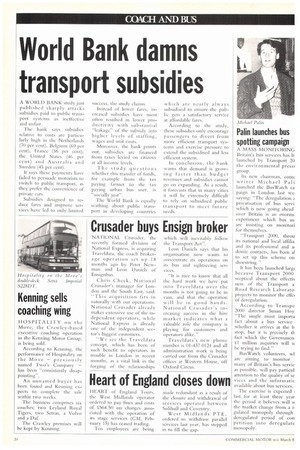World Bank damns transport subsidies
Page 20

If you've noticed an error in this article please click here to report it so we can fix it.
A WORLD BANK study just published sharply attacks subsidies paid to public transport systems as ineffective and unfair.
The bank says subsidies relative to costs are particularly high in the Netherlands (70 per cent), Belgium (69 per cent), France (56 per cent), the United States (46 per cent) and Australia and Sweden (45 per cent).
It says these payments have failed to persuade motorists to switch to public transport, as they prefer the convenience of private cars.
Subsidies designed to reduce fares and improve services have led to only limited success, the study claims.
Instead of lower fares, increased subsidies have most often resulted in lower productivi t y with substantial "leakage" of the subsidy into higher levels of staffing, wages and unit costs.
Moreover, the bank points out, subsidies are financed from taxes levied on citizens at all income levels.
The study questions whether this transfer of funds, for example from the tax paying farmer to the tax paying urban bus user, is "socially just".
The World Bank is equally scathing about public transport in developing countries which are nearly always subsidised to ensure the public gets a satisfactory service at affordable fares.
According to the study, these subsidies only encourage passengers to divert from more efficient transport systems and exercise pressure to extend the subsidised and less efficient system.
In conclusion, the bank warns that demand is growing faster than budget revenues and subsidies cannot go on expanding. As a result, it forecasts that in many cities it will be extremely difficult to rely on subsidised public transport to meet future needs.






































































